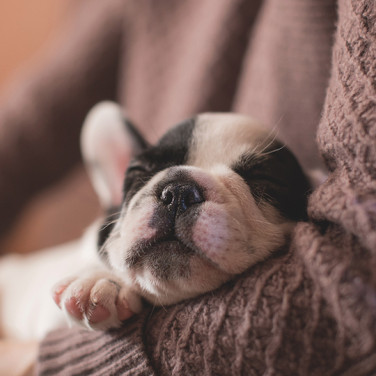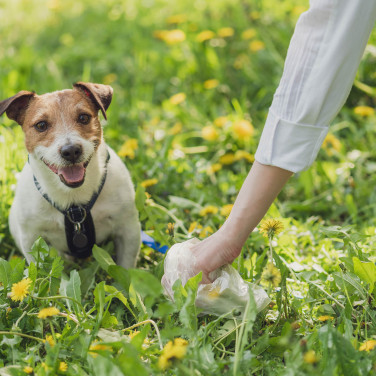SYMPTOMS
Why is my Dog Suddenly Peeing in the House? Causes and Treatments
페이지 정보
본문


Overview of why dogs suddenly pee and poop in the house
If your puppy starts having accidents inside the house even when potty trained, it could be a sign of a health issue. If you notice an increase in bowel mistakes, the first step is to determine the cause of this behavior. This could be due to behavioral issues, age-related problems, or medical conditions such as a urinary tract infection (UTI). If the cause is a medical issue, it can be diagnosed and treated, and if it is a behavioral issue, addressing any anxiety factors and providing training can help correct the behavior. It is important to avoid scolding your puppy for bowel mistakes as this can make the problem worse.
Common causes for dogs suddenly house soiling
In young puppies, potty mistakes may occur due to not being fully potty trained or having underdeveloped bladders. On the other hand, if an adult dog that has been potty trained suddenly begins making potty mistakes again, there may be a medical or behavioral issue present.
Medical causes for a potty-trained dog peeing and pooping in the house:
-
Urinary condition
The most common problems with the urinary tract are UTIs (urinary tract infections), stones, and, in older dogs, cancer. In males, prostate diseases such as inflammation, overgrowth, and tumors may also occur. If your dog is experiencing difficulty urinating, increased frequency of urination, blood in the urine, or a strong odor, there may be a problem with their urinary system.
-
Urinary incontinence
Urinary incontinence is the inability to control urine on one's own, resulting in leakage of urine in drops when walking or remaining in place while resting or sleeping. It can be caused by pressure changes in the urethra and problems with nerve control in the bladder.
-
Endocrine and metabolic diseases
In the presence of endocrine disorders, such as diabetes and Cushing's disease, urine output may increase with an increase in fluid intake. These conditions may also be accompanied by symptoms such as appetite changes, changes in skin condition, vomiting, and diarrhea. Additionally, metabolic diseases like kidney and liver disease can also cause an increase in urine output, which may be accompanied by symptoms such as lethargy, vomiting, and diarrhea. Long-term use of steroid-type drugs can also increase water intake and urine output due to changes in metabolism in the body.
-
Gastrointestinal disease
Diarrhea can occur as a result of a digestive system disease, and the inability to control bowel movements may cause feces to be present throughout the house.
-
Seizure
Seizures may be accompanied by sudden urination and defecation. Owners may not witness their dog's seizures and may only find urine and feces left in the house.
Age-related causes common in older dogs peeing and pooping in the house:
-
Cognitive dysfunction syndrome (CDS)
Older dogs can develop cognitive impairment similar to dementia in humans, which can lead to errors in urination and defecation. People with cognitive impairment syndrome may forget house rules, including where the bathroom is located. If your dog has cognitive impairment syndrome, symptoms may include disorientation, pacing, and head pressing.
-
Arthritis
If your dog is older and has arthritis, it may begin to practice urinating and defecating while sitting or not moving because it experiences pain when standing up or walking.
Behavioral problems common in dogs suddenly peeing and pooping in the house:
-
Anxiety and fear
Anxiety and fear can trigger symptoms in potentially stressful situations, such as when your dog hears thunder, someone new comes to your home, or when they are left home alone. Signs of anxiety and fear include restlessness and panting.
-
Environmental change
One of the primary causes of urination and defecation mistakes in dogs is a change in their environment. This can include moving to a new location, purchasing new furniture, or rearranging existing furniture, which can be disorienting for your dog. Symptoms can also occur when their schedule changes, such as when there are new people or pets visiting, changes in their lifestyle, or alterations in their walk times.

-
Overexcited urination
Peeing when overexcited is more common in young puppies, but it can also occur in adult dogs. Urination caused by excitement can happen when the owner comes home from work when a snack is given, or when a new person comes home. In young puppies, this often disappears naturally as the dog becomes an adult.
-
Submissive urination
It refers to the behavior of a dog urinating as a sign of obedience and can occur when he is with other animals as well as his owner. This behavior can manifest when the caregiver comes home, is scolded, or during obedience training. It can also appear when an abused dog comes into contact with other people or dogs, or when a young dog is put into a frightening situation.
-
Weather
Your dog may be reluctant to go outside to defecate in bad weather conditions, such as rain, heat, cold, thunder, or heavy snow. This may lead to accidents in the house due to the dog holding back their bowel movements.
-
Marking
Marking territory by urinating in small amounts called marking, can occur in both young puppies and older dogs. It is more common in unneutered males due to hormonal influences. If you bring a new pet, person, or piece of furniture into your home, your dog may mark it as a sign of their territory. Only a small amount of urine is used in the marking process.
Symptoms and signs that can help identify why a dog suddenly starts peeing or pooping in the house
Depending on the cause of house soiling, the following symptoms may occur together:
- Signs of pain (screaming during a bowel movement or licking the genital area)
- Hematuria or bad odor urine
- Vomiting and diarrhea
- Increased bowel movement frequency and increased thirst
- Changes in appetite
- Changes in skin condition (rough skin or hair loss)
- Difficulty standing up or not walking
- Signs of cognitive dysfunction syndrome (disorientation, aimless walking, or head pressing behavior)
- Behavior changes (chewing bedding, furniture, and other objects, frequent barking, etc.)
When to take the dog to the vet for peeing and pooping in the house
Low water intake and skewed eating habits increase the risk of urinary tract infections and stones. If the infection and stones become severe, hematuria may occur, and in severe cases, the urine cannot be excreted, resulting in acute kidney injury and congestive heart failure, and even a risk of sudden death. Therefore, if you experience hematuria or an inability to urinate, it is recommended that you visit a veterinary hospital immediately.
Endocrine and metabolic diseases can cause not only simple urination problems but also systemic changes due to hormonal imbalances and abnormal metabolites in the body. If you notice lethargy, vomiting, diarrhea, skin changes, appetite changes, and vitality changes, it is recommended that you visit a veterinary hospital for examination. Additionally, if anxiety, boredom, or a change in the environment is present, urination and defecation errors may occur as behavioral problems. If these symptoms persist after attempting to correct the behavioral issue at home, it is important to consult a veterinarian for prompt correction through the appropriate method.
If clinical symptoms are not severe in an elderly dog and cognitive impairment syndrome is suspected, it is not a major issue. However, urinary problems in older dogs can also be caused by metabolic conditions such as kidney disease. Therefore, it is recommended to visit a veterinary hospital if the symptoms worsen or are accompanied by other clinical symptoms in elderly dogs.
Home treatment for dog suddenly peeing or pooping in the house
If your dog’s sudden house-soiling behavior is caused by environmental changes or behavioral problems, there are several things you can try at home to address the issue. However, if the cause is a medical problem, it is necessary to visit a veterinary clinic and seek professional help.
-
Create a hygienic environment
Dogs have a habit of urinating in the same place due to the scent of their urine. It is recommended to clean the area immediately after urination and defecation and completely eliminate their odor. Since dogs are sensitive to sour smells, it may be helpful to use a 1:1 dilution of vinegar and water or a citrus scent such as lemon or orange to remove the smell.
-
Eliminate anxiety factors
If there has been a recent change in their environment or if you notice something causing them anxiety, eliminating or blocking that stressor can help. If your dog has separation anxiety, repeat the behavior of leaving, closing the front door, and then returning, to teach them that you will come back and help them realize that it is not a big deal. Gradually increasing the distance and time you spend away from them after closing the door behind you can help reduce their separation anxiety. For dogs who feel anxious, behavioral enrichment activities such as walks, nose walks, and toys can also help.
-
Re-potty training
It may be appropriate to re-potty train your dog and help induce urination and defecation after drinking water or eating a meal. You can also consider increasing the frequency of urination by taking more walks. Giving consistent rewards and praise after proper bowel movements can help assist in creating the desired hygienic behavior. It is important to avoid chastising behavior, such as shouting or hitting after a mistake, as dogs are unable to understand that your punishment is a reaction to something they did wrong and instead quickly associate you as a source of anxiety and stress. If you see your dog about to go or going in the wrong place, it is a good idea to say 'no' briefly and firmly and to take them to the appropriate place to urinate or defecate.
How is sudden house soiling diagnosed in dogs?
When you visit the hospital due to your dog having repeated house soiling accidents, the veterinarian will determine whether the cause is a medical or behavioral problem through a quick survey of questions and examination.
Your veterinarian may ask you questions such as:
- When did the symptoms start?
- Under what circumstances does your dog usually make mistakes in urination/defecation?
- Is there any change in the color and smell of your dog’s urination/defecation?
- Are there any changes in the frequency of bowel movements and the amount of water intake?
- Are there any changes in your dog’s appetite?
- Does your dog have any symptoms of vomiting and diarrhea?
- Have there been any recent changes in their surroundings?
Afterward, the kidneys, bladder, prostate, and genital organs are palpated, and skin and joint problems are also checked to identify an accurate diagnosis.
For a more detailed diagnosis, the following tests may be performed:
-
Urinalysis & urine culture test
It can check for urinary tract infections (UTIs) and the presence of stones, and a culture test can check for bacterial infection.
-
Fecal test
If your dog has diarrhea, a veterinarian can check for infectious causes through a stool test
-
Blood test
It can check for abnormalities in the body, including metabolic disorders and endocrine disorders.
-
Abdominal X-ray and ultrasound
Imaging tests can be used to detect abnormalities in the kidneys, bladder, urethra, and prostate, as well as other abdominal organs.
What is the treatment process like for dogs suddenly peeing and pooping in the house
-
Urinary conditions
Antibiotics are used to treat urinary tract infections. If your dog has stones, such as cystitis, they are usually managed with medication and dietary changes. However, if the stones are severe or if tumors are present, surgery may be considered as an option.
-
Urinary incontinence, metabolic, and endocrine disorders
Drug treatment according to the disease can be carried out through a diagnosis by a veterinarian.

-
Arthritis and CDS
Senior dogs inappropriate elimination can be managed through medication and supplements.
-
Behavioral problems
To correct this behavior, remove the cause of anxiety and provide appropriate training. If training at home does not improve the situation, your veterinarian may suggest a behavioral treatment plan.
-
Neutering surgery
Some behavioral issues may improve with neutering, but this should be determined in consultation with your veterinarian. If there are tumors of the reproductive system present, such as prostate hyperplasia or tumors, neutering surgery is typically performed.
Prevention for inappropriate elimination in dogs
In the case of UTIs and urinary stones, ensuring a clean constant source of spring water can help prevent those medical causes for accidents. Wiping the genital area after a walk or taking a regular shower also helps to prevent infection. To prevent behavioral problems such as anxiety, fear, and boredom, engaging in behavioral enrichment activities, such as walking the dog and playing various games, can be helpful. If a new person or pet visits your home, it is a good idea to give your pet plenty of attention as well.
Find out more about your dog’s symptoms and diseases on the Buddydoc app!

The Buddydoc library is filled with everything you’d want to know about each symptom and disease your pet may experience. If you would like to find out more about the causes, signs, treatments, preventions, and more for your dog’s disease. Try out the Buddydoc app and search your pet’s symptom or disease in the Buddydoc library.












